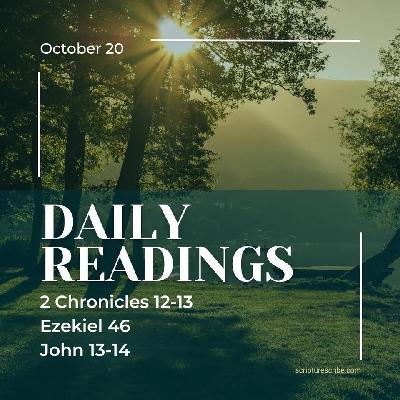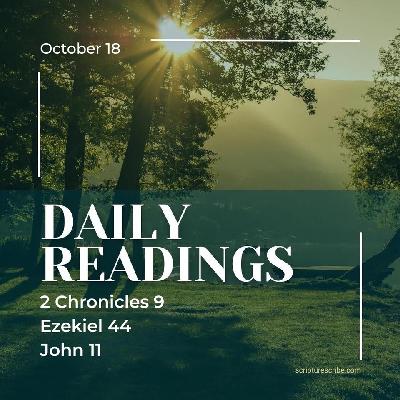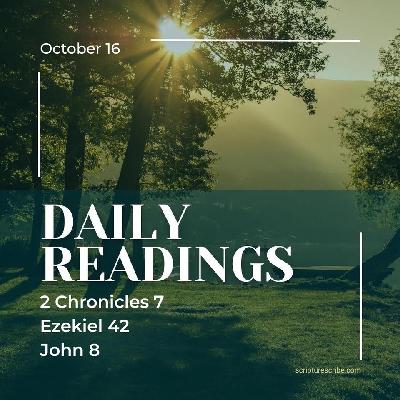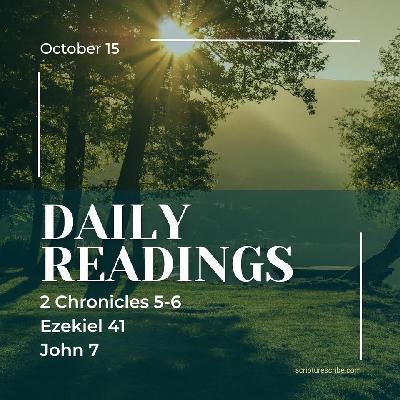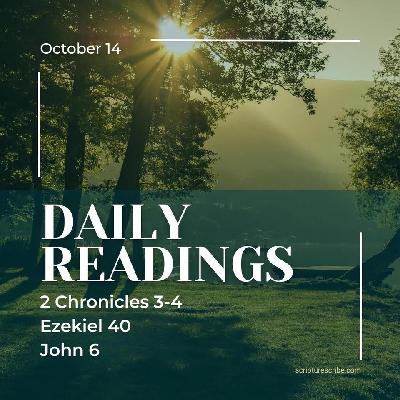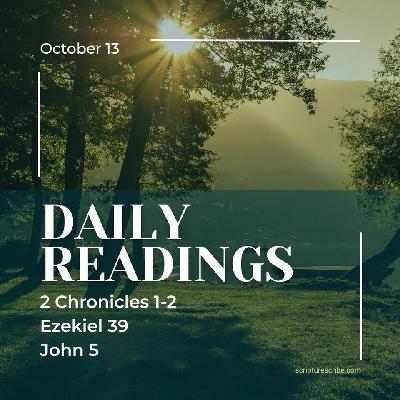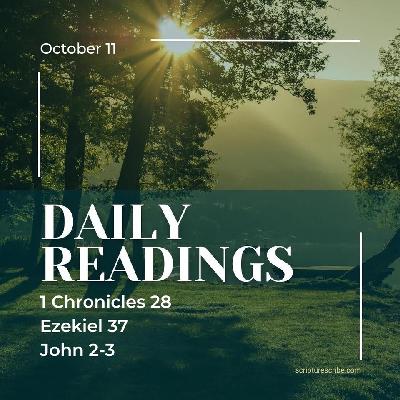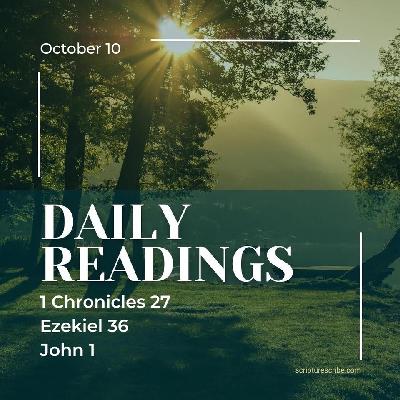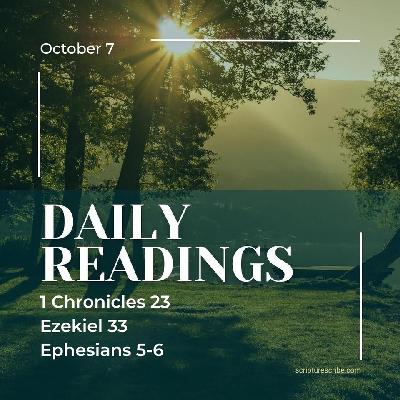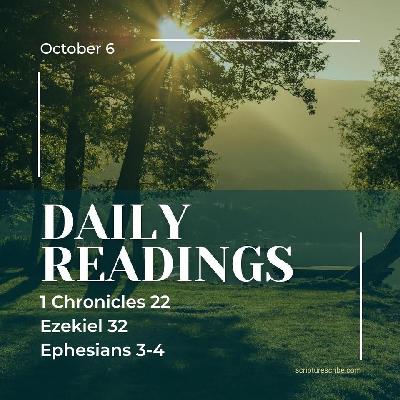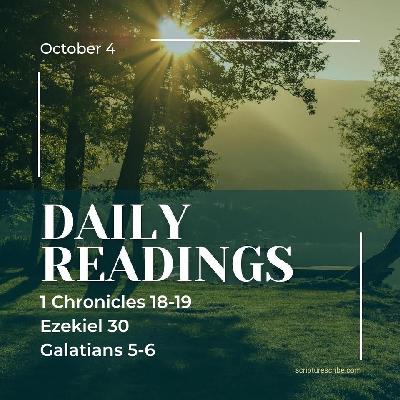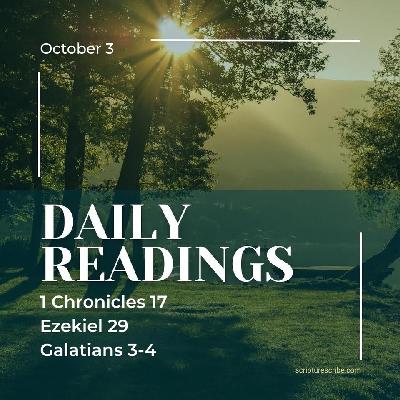Discover The Bible Standard - Discover the Truth.
The Bible Standard - Discover the Truth.

1024 Episodes
Reverse
2 Chronicles 12 saw Rehoboam become lifted up and forsake Yahweh. As a consequence, Shishak of Egypt was sent in judgment against him. But because the king and princes humbled themselves they were not destroyed. But unfortunately, his Ammonite mother led him in evil ways. In chapter 13 we read of Abijah's reign in Judah. In the third year of his rule, he went out to battle with a mighty army against Jeroboam; whose idolatry he scorned. He warned Jeroboam to desist as they were certain to fail. Half a million Israelites were slaughtered. Jeroboam never recovered and was relentlessly pursued by Abijah. Ezekiel 46 deals with the entering of the prince through the eastern gate - verses 1-8 - the entering and leaving of worshippers to the LORD's House - verses 9-10 - and the appointed feasts - verses 11-15. Verses 16-18 speak of the land grants given by Messiah the Prince i.e. our Lord Jesus Christ. Verses 19-24 describe the size and functions of the massive corner kitchens which were approximately 145 metres in height. These are likely for food preparation for the millions of worshippers who will constantly flow into Yahweh's Sanctuary: "The House of prayer for all nations". In John 13 we have Jesus' demonstration to his disciples of love, when he girds himself with a towel in the form of a servant (Philippians 2) and washes their feet. When Jesus came to Peter he was told you're not going to wash my feet. He was told unless I wash your feet you can have no part with me. Peter's response was, "Wash all of me". Jesus said that the believers need only their feet be washed. Jesus had given the great example of loving service; and that from the one who was their Lord and Master. We must follow that exemplary service. Our Lord spoke of his betrayal and after given the sop - a sign of friendship -to Judas the betrayer left intent on completing the deliverance of his Lord into the hands of Christ's enemies. When Judas left Jesus' response was, "Just now was the Son of Man glorified". He told the disciples of a new commandment, which was not entirely new, but certainly it was to the extent our Lord demonstrated in the laying down of his life revealed 'agape' to an extent never been seen before. Peter's threefold denial was prophesied. In chapter 14 we are told that Jesus is, "the way, the truth and the life"and that no one can come to the Father but through the Lord. Philip said, "Show us the Father and thatwill be enough. Jesus response was "Haven't you been with me long enough to have seen the Father's character revealed?" Jesus promised the Holy Spirit as their Comforter, when he was to be taken from them. They would be left with peace - not the absence of strife, but the understanding that all things arein the Father's control. So, they left the upper room for further instruction.
Thanks for joining us - we pray you found these comments helpful in your appreciation of God's words, join again tomorrow
In 2 Chronicles 10 we have the folly of an indulged and entitled young man - Rehoboam. The burden of administration had become massive under Solomon and the people asked for relief when Solomon's son came to the throne. The older counsellors recommend following the request, but his peers say tell the people that it will only become tougher. Foolishly Rehoboam takes his peers' advice and the result is a division of the kingdom with 10 tribes siding with their spokesman - Jeroboam. When Rehoboam sends his treasurer - Hadoram - he is stoned and Rehoboam flees in his chariot. Chapter 11 tells of Rehoboam securing his kingdom and being joined by the Benjamites and Levites. Like his father, Solomon, Rehoboam multiplies wives, which the king was forbidden to do by the Law of Moses Deuteronomy 17.
Ezekiel 45 outlines the massive portion assigned to the Prince Messiah i.e. our Lord Jesus Christ. The chapter speaks of the need to deal righteously in measurement. This is also prominent feature in the Law of Moses. The Prince is to provide the daily burnt sacrifices and sundry offerings. Additionally, Messiah is to supply the offerings for the three main feasts i.e. Passover, Weeks and Tabernacles. In John 12 Mary anoints Jesus' feet with precious ointment and because of that the odour fills the house. This alleged waste of precious ointment becomes the catalyst for Judas going to the high priest and seeking opportunity to betray the Lord. Judas was the treasurer and a thief. There follows a plot to kill Lazarus and the chapter describes Jesus triumphant entry into Jerusalem. Philip brings some Greeks to see Jesus - this greatly encourages our Lord. Christ speaks of his being lifted up to glorify God in his crucifixion. Isaiah prophesied that in chapter 6 and this was to be the great stumbling block for the Jews to believe that Messiah could be crucified: 1 Corinthians 1 verse 23. Our Lord had come into the world to save believers, whom he would raise up at the Last Day.
Thanks for joining us - we pray you found these comments helpful in your appreciation of God's words, join again tomorrow
2 Chronicles 9 tells of the visit of the Queen of Sheba - a rich and influential spice kingdom near the Horn of Africa. That Queen came to prove Solomon with hard questions and was astounded by his answers. The monarch from Sheba had been reluctant to believe what she had heard in her own country, but confesses that what she has seen and heard exceeded her expectations. That magnificent queen gifts spices and wealth to Solomon and makes a league with him. The chapter tells us of Solomon's control of the commerce of the entire region. Solomon dies after a 40-year glorious reign (though stained by his idolatrous unions in marriage which are not mentioned by the chronicler). Ezekiel 44 deals with the gate for the Prince - Messiah and instructions regarding the mortal Levitical priests. Verses 1-3 speak of the eastern gate of the outer square buildings of the Sanctuary being reserved for the use of the Prince i.e. Messiah - the Lord Jesus Christ. Only immortals can accompany Jesus the King of Glory in the eastern wing of the Temple. Verses 4-8 speak of the glory that Messiah brings and takes us to the North Gate where mortals may enter and receive the ministrations of the faithful mortal Levitical priests. Verses 9-14 tell us of the mortal worshipers who come to this House of Prayer for all nations: Isaiah 56:6-7. Zechariah 14 also gives more details of the worshipers coming to Jerusalem: Zechariah 14 verse 9, 16-21. Verses 15-27 contain the regulations for those Levitical priests. Verses 28-31 contain echoes from the Law of Moses and remind us that those priests will have no lands allocated to them since Yahweh is their portion. Those priests will receive an allocation of the fruits, vegetables and other foods of the Land.While beyond Jordan Jesus is informed that his friend Lazarus is gravely ill and the messengers request that Jesus come immediately. But verse 4 says that our Lord's response is to declare that this sickness of Lazarus is not unto death; but that Jesus might be glorified. After two days delay our Lord goes to his friends. Christ tells his disciples not to stumble; but to walk in the light, as long as the Light i.e. our Lord is with them. Jesus now plainly says that Lazarus is dead. This information probably raising more questions for his disciples than answers. When our Lord arrives note Martha's unshakable conviction that Jesus is the resurrection and the life and anyone believing in him would be raised up at the Last Day. Mary, however, had had her confidence in her Lord undermined by the Jewish rulers - called throughout John's account "the Jews". This caused Jesus to weep. The whole scenario was an out-working of the prophecy of Jeremiah 13 verses :15-17, which verses are cited three times by our Lord in John 11:4-10. To show that Lazarus is one of the Lord's sheep when our Lord's voice of command is spoken with authority Lazarus came forth alive. Lazarus walked out in his grave clothes indicating that this was not the resurrection of the last day that Martha had spoken of. How infuriating to the authorities that Jesus had raised Lazarus. Did they respond to this miracle in belief - no? They immediately sought the death of Lazarus death and schemed Jesus' own destruction. Caiaphas takes the lead in these matters. The Lord had predicted these events in his parable in Luke 16.
Thanks for joining us - we pray you found these comments helpful in your appreciation of God's words, join again tomorrow
2 Chronicles 8 told of Solomon's accomplishments in the administration of his realm. Verses 1-2 tell us that 20 years were spent in the building of Solomon's own house and the Temple of the LORD. Verses 3-10 describe king Solomon's industriousness in providing for his kingdom. Verse 11 states that king Solomon built a separate palace for Pharaoh's daughter who seems to have been the love of his life and the wife spoken of in Psalm 45 and in the Song of Solomon. Verses 12-15 says that at the beginning of his rule Solomon was active in promoting the worship of Yahweh his God. Verse 16 returns to king Solomon's greatest accomplishment in the building of the Almighty's House. Verses 17-18 tell of the great golden wealth that came annually to Solomon. In Ezekiel 43 we have the climax of the prophecy with the King of Glory coming to his temple through the East Gate from whence it had left in chapter 10 verse 4. Also read Psalm 24 which was originally composed by David as it spoke of the glorious arrival of the ark in Jerusalem: see also Psalm 132 and 1 Chronicles 16. It is likely that this Psalm may be sung to celebrate the arrival of the King of Glory via the eastern gate as the temple is inaugurated. This eastern gate of the Sanctuary is reserved for the Messiah. We also have the arrangements for the altar, as there will be animal sacrifices in the kingdom. Animal sacrifices in the Kingdom, pointing backwards to Christ just as those under the Law of Moses had pointed forwards to him. In John 9 we have the 6th sign in the healing of the blind man. The discussion in this chapter is similar to the pattern established in chapter 5. Both the blind man and his parents are persecuted by the rulers for accepting Jesus. The formerly blind man gives a remarkable and compelling testimony that Jesus must be from God. The religious leaders spitefully cast out the man who has dumbfounded them with scriptural logic. Our Lord later finds this man in the temple so as to complete his restoration. These events most likely happened at the feast of the Dedication. John 10 is the magnificent account of Jesus being the door and the Good Shepherd. Christ had come that believers might have life and have it more abundantly verses 10-11. Our Lord by laying down his life for his sheep secured for believers that wonderful hope of eternal life in the kingdom of God. Once again the theme of chapter 10 contain echoes from and are an elaboration of chapter 5 i.e. that his sheep will recognise his voice. In the purpose of bringing salvation to believers he and his Father are one i.e. united - but our Lord's power is derived from his Father. The Jews reacted to our Lord's words and by claiming that he was speaking blasphemy. Jesus proves from Psalm 82 that the judges of Israel were called "god" as they spoke God's Word. The chapter
finishes with Jesus going across the Jordan for some months - in Perea - where he remains until the events of chapter 11 would bring him back.
Thanks for joining us - we pray you found these comments helpful in your appreciation of God's words, join again tomorrow
In 2 Chronicles 7 Yahweh answers Solomon by fire to accompany the huge number of sacrifices. Verses 1-3 tells us that when the priests saw this miraculous event that they responded by praising Yahweh forHis lovingkindness. Verses 4-6 says that there was an incredible number of animals slain as the priests blew their trumpets at the dedication of the House. Verse 7 says that additional to the offerings mentioned before there were peace offerings, burnt offerings and grain offerings made. Verses 8-10 speaks of the great assembly being gathered from the ends of the Land. Verses 11-18 say the Almightyappears to Solomon the second time and speaks of His sincere response to Solomon's loving and dedicated prayer. His ears would always be open and He would respond with loving kindness. Solomonurges his people that whenever they are in trouble they need to beseech their Almighty and loving Sovereign as He will be responsive to their pleas from His House - verse 15. Verses 19-22 indicate thatthe blessings on Solomon and his people are conditional and dependent on their obedience. Note therecurring use of the word IF in these verses.
Ezekiel 42 describes the temple's chambers i.e. small rooms. These chambers occupy the entire length of the outer square buildings. These rooms may be for the instruction and meeting the needs of the worshippers who will come in their millions. They measure 500 reeds in length for each side (north, south, east and west) - that is of six cubits (being the Royal cubit of two feet in length - making each side of the House about 1.8288 kilometres long. The perimeter of the Temple would therefore be about 7.31 kilometres. Some versions of John 8 omit the earlier verses of this chapter. There can be little doubt that they should be included in the record. A woman was brought to the Lord caught in the very act of adultery. Where was the man also caught in the act? It was a set up designed to trap Jesus. The Law of Moses made it very clear that adultery was punishable by stoning. As the Lord's enemies persist in goading Jesus he says: "Let the one without sin cast the first stone". Then Jesus stoops down and writes in the dust - most likely our Lord wrote their names in fulfilment of Jeremiah 17 verse 13. One by one the Lord's foes leave beginning at the eldest. Finally, the woman is left alone with Christ and although he does not condemn her she is charged to go and sin no more. This obviously meant an abandonment of her current manner of life. A discussion follows as to Jesus being the light of the world - one of the many Messianic titles John uses. This leads on to a discussion regarding origins - our Lord was from God but his adversaries were murderous liars and were in no way children of Abraham. Only the truth could set them free. Finally, Jesus astounds his foes with a claim that he is the entire focus of God's purpose. Abraham understood this and rejoiced in that knowledge.
Thanks for joining us - we pray you found these comments helpful in your appreciation of God's words, join again tomorrow
2 Chronicles 5 describes the ark being brought to Zion and its resting place in the Most Holy Place. The final picture of immortality the cherubim - represents the unity of believers with their Lord.; as it was made out of the same piece of gold and perpetually recognising his sacrifice and glory. The choir praises the "chesed" i.e. the lovingkindness of Yahweh. Chapter 6 describes Solomon’s prayer at the dedication of the house. Note the humility of Solomon as he offers his prayer and the repetition of the phrase - "Hear in heaven, Your dwelling place". No physical house can contain our magnificent Sovereign. The whole ceremony is blessed by God. Note the pertinence of the words that we must extend the LORD's tender mercies i.e. loving kindnesses to others as we surely recognise our need of Yahweh's mercy. Punishment would be brought to Israel for their disobedience to their Sovereign to bring the nation back to God. Once again there is an allusion to Psalm 132. Ezekiel 41 tells us of the inner temple and the folding double leaved doors. Verses 1-26 describe the entrance rooms to the inner circle of buildings which constitute the Most Holy Place. Readers are encouraged to consider the writings of Henry Sulley - an architect from Nottingham - on Ezekiel chapters 40-48 in his book titled "The Temple of Ezekiel's Prophecy". Palm trees and cherubic figures are to befound in the vestibules of the Most Holy Place. Ezekiel's enthusiasm was heightened by the coming visionof the future house of prayer for all nations. May our contemplation of this glorious day likewise enlivenour hope and desire to likewise be there.John 7 records an unannounced visit of Jesus to Jerusalem at the Feast of Booths i.e. Tabernacles. There was a division among the people, as to whether our Lord was a good man, or a deceiver of the people. Jesus arrives in the middle of the feast. Many were convinced that he was the Christ. Although officers from the Sanhedrin were sent to arrest Jesus they could not do so because his time had not yet come. Jesus prophesied to them of his ascent to heaven and the giving of the Holy Spirit. Some said that this was the prophet like Moses. Others rejected this idea just because our Lord was from Galilee. Jesus just like Jonah, also from Gath-Hepher in Galilee told his audience to consider the sign of the prophet Jonah. We have seen in our earlier studies that the sign had many levels of significance and spoke primarily both of Jesus' resurrection and witnessing.
Thanks for joining us - we pray you found these comments helpful in your appreciation of God's words, join again tomorrow
In 2 Chronicles 3 we are told of the building of the temple. This building commenced in the 2nd month of the fourth year of Solomon's reign. We know that the Temple was completed and dedicated in 1,004 BC. It was constructed on the site of Ornan's threshing floor. Verses 1-7 describe the precious materials used in its construction. Verses 8-9 tells us the dimensions and quantity of gold used for the Most Holy Place. Verses 10-14 speak of the construction of the golden cherubim of the Most Holy. Verses 15-17 outline the fabrication of the two bronze pillars at the entrance of the temple - Boaz (the strong one) and Yachin (God will establish). These pillars are typical of the work of our Lord Jesus Christ. Chapter 4 records the furnishings of the temple. It is worth noting that modern metallurgy does not have the skills to make the brazen sea that was made 3,000 years ago. Verses 1-6 describe the making of the brazen sea in the courtyard that speaks of cleansing by the water of God's Word as we first approach Him. Verses 7-10 inform us of the 10 golden Lampstands that illuminate the Holy Place. In verse 7 we see that these Lampstands represent our Lord Jesus Christ and his saints Jew and Gentile which will provide the gospel's light to the world: Zechariah 4:10-14. As our Lord Jesus walked among his people he was continually enlightening them. To. Us now it symbolises our Lord Jesus Christ as the light to our path as we walk towards God's kingdom: Psalm 119:105. Verses 11-18 enumerate sundry furnishings and provide further details of the appearance and manufacture of the bronze sea. Verses 19-22 conclude the description of the Temple. The golden table of shewbread - literally "the bread of the faces" - speaks of Yahweh's provision on a constant basis for His people in provision of fellowship with Him until the seventh day when the bread is changed - telling of the immortalisation of the saints of God. In Ezekiel 40 we have the prophet being given a vision of the coming temple. It had a structure like a city. This Temple is of immense proportions for it is to be a House of Prayer for all nations in Messiah's Kingdom. From verses 5-16 we are given a description of the most important gate - the east gate. It is through this gate that the Lord Jesus Christ enters the temple. Then follow descriptions of the outer court, the north and south gates, the inner court and the chambers (or rooms) of the priests. Lastly we are given a description of the vestibule of the temple. John 6 recorded signs 4 and 5 - the feeding of the 5,000 and our Lord's walking on the troubled sea. The feeding of the 5,000 took place in spring - a time of abundant green grass. It was Passover time (12 months before Jesus' crucifixion) and just after the death of John the Baptist. Jesus, in testing Philip, asks where can Jesus and his Apostles purchase sufficient bread in the wilderness for this crowd; for our Lord already knew what he was going to do. From the personal lunch of a lad - five loaves and two fish Jesus feeds 5,000 and collects 12 baskets full of fragments. Having full bellies, the multitude wants to forcibly make Jesus their king. Our Lord rapidly disperses the crowd and sends the disciples away by boat. Jesus goes into a mountain to pray. The Lord comes to the disciples walking on the water. No sooner had he joined them than they arrive at Capernaum - the city of comfort. This is a parable illustrating our vain toiling on the troubled sea of nations as we await the return of our Master. As soon as Jesus returns we will receive the peace he brings and the comforts of the kingdom age. At the synagogue in Capernaum a discussion takes place as Jesus tells them that he is the 'bread of life' - in contrast to the wilderness manna eaten by their fathers. The Son of God has been sealed in his thinking by his Father; and what they need to do was believe. Their being saved is through what the Father has done through His Son and all they can do is to accept this by believing on His Son. Isaiah 55 is a key link to this chapter and it focused on resurrection - "the sure mercies, i.e. 'chesed' of David". Note the emphasis in John 6 and how many times Jesus refers to resurrection - verses 39, 44. Verse 45 quotes from Isaiah 54 verse 13. All who believe the
faithful message of the gospel are "taught of God". Jesus found that many would-be disciples leave him being unable to cope with the challenging ideas our Lord Jesus presents. Peter's encouraging and supportive words for his Lord particularly and for every potential disciple when says in verses 68-69, "Lord, to whom shall we go? You have the words of eternal life, and we have believed and come to know, that you are the Holy One of God". ESV Jesus though encouraged reminds Peter and the other Apostles of the rocky road ahead when he refers them to the challenges that are to come from Judas Iscariot: see verses 70-71. Let none of us trust in ourselves for the heart of mankind is "diabolos' - treacherous.
Thanks for joining us - we pray you found these comments helpful in your appreciation of God's words, join again tomorrow
In chapter 1 of 2 Chronicles Solomon worshipped at Gibeon and later that evening when Yahweh appeared to him, he was told to ask from God whatever he desired. Solomon's response was to ask wisdom to rule the people of the LORD in a wise way (this showed that Solomon had a degree of wisdom in making such a request). In addition to wisdom Solomon was granted great wealth. In chapter 2 Solomon prepares for the building of the temple and commences his rule in great humility. Solomon's start to his reign was remarkable. The king had, perhaps, the greatest potential of any of Israel's monarchs. The king's heart was towards his divine Sovereign but was sadly later misdirected by his marrying of foreign wives who took the king away from God. Chapter 39 of Ezekiel tells of the devastation wrought on Gogue and his hosts. They will fall in their multitudes and be carrion to the birds of prey - those birds who will feed on the slaughtered symbolise many other nations. Gog (Gogue) and his multitude will be given a place of graves east of Jerusalem - and this mausoleum will be called Hamon-Gog. It will take seven months to bury the dead. When Yahweh magnifies Himself in this great victory Israel and all nations will recognise the power that resides in that Great and Holy Name. Our Sovereign will exalt and restore His people Israel to be the head of the nations and will place His spirit within them. John 5 gives the third sign recorded in his account in the healing of the impotent man at the pool of Bethesda (meaning "the house of mercy"). It would seem that the Jews had a superstition about this place - just as surrounds the mythology of Lourdes. Some translations add, 'it was said that an angel ..'. The man was about 38 years old and a symbol of Israel, who for 38 years were powerless and perishing in wilderness. The miracle occurs on the Sabbath day and so this is a continuation of the Jews seek to contentions with our Lord about the Sabbath day. In verses 19-47 Jesus witnesses to his sonship,
authority and truth. There was no equality between our Lord and his Father - Jesus' power was derived from his Father and without God Christ could do nothing. But the authority of the Word of Jesus, as he says, extended to raising the dead. The morally dead who listened would be enlightened and enlivened by the saving words of the gospel. This would mean that having now 'heard' the voice of the Son of God; they would be brought to life as they will be called forth to resurrection when Jesus returns to earth. The chapter concludes with Christ outlining the "witnesses" that incontrovertibly prove he was from God. This chapter demonstrates both the spiritual conception i.e. "new birth" in verses 24-27 and physical resurrection which precedes birth to spirit nature verses 28-29.
Thanks for joining us - we pray you found these comments helpful in your appreciation of God's words, join again tomorrow
1 Chronicles 29 outlines the extensive offerings for the temple, that David in gratefulness to God had prepared. And like the Tabernacle those offerings had had come from willing hearts - verse 9 compare Exodus 25:2. David then prays for the Assembly and asks that whatever those assembled had done would be acceptable to the Almighty. Note the similarity between David's prayer and the Lord's Prayer in Matthew 6. Also take notice of the deep spirit of humility in which it was offered. Solomon was anointed
king for the second time and we need to consider the import of verse 23 "He sat as king upon the throne of Yahweh over Israel". Thus began the kingdom of God on earth in its first constitution. David dies and is buried and let us consider the Apostle Paul's comments on David's faithful service in Acts 13 verses 36-37. Ezekiel 38 speaks of an invasion of the recently regathered and reconstituted nation of Israel (verses 7-8). The chapter speaks of a northern confederacy headed by one termed Gogue - meaning 'roof', or 'one at the top'. Looking at a map of Eurasia we need no imagination to be able to see the nation being spoken about. The leader of this nation is called in the Hebrew tongue prince of Ros, Meshech and Tubal - the ancient names for Russia, Moscow and Tobolski as many lexicographers tell us. In a book by a notable Russian historian (George Vernadsky - he says Ezekiel 38 is the first historical reference to Russia. Note the alliances mentioned and much of this has already transpired. This Eurasian confederacy is opposed by Israel and Arabian countries (verse 13). The principal aggressor comes from the "uttermost parts of the north" (verse 16 RSV). Moscow is directly north of Jerusalem. Verses 17-23 indicate that the LORD GOD ALMIGHTY will come to the aid of His beleaguered people and there will be a great earthquake (see Zechariah 14 and Joel 3 verses 16-21). It will be occasioned by the feet of the Lord Jesus Christ standing on the Mount of Olives. This was promised by the two angels at Jesus' ascension to heaven: Acts 1:1-11 compare with Luke's other record in Luke 24 verses 50-52. John 4 deals with the incident between Jesus and the woman of Samaria in which he offers her "living water". There follows a discussion between Jesus and the woman about the site of acceptable worship - Jerusalem, or Gerazim. Jesus firstly tells her that salvation is from the Jews. Acceptance by God is dependent on two factors sincerity and truth - these have always been the focus at Shechem, and with Joseph and his brothers in Egypt (Joshua 14 verses 14-15; Judges 9 verses 14-15). The woman accepts Jesus as the Christ (Messiah) and she then has an incredible impact on helping the Samaritans to receive Jesus also. Philip would about 7 years later reap the gathering harvest now being sown. That harvest is spoken about in Acts 8. From verse 46 to the end of John chapter 4 our Lord Jesus heals the son of an official from Capernaum - this being the second of the signs recorded by John and resulting in the official and his household believing in the Lord Jesus Christ. That Nobleman is thought by some to be Herod's keeper of the larder Chuza
Thanks for joining us - we pray you found these comments helpful in your appreciation of God's words, join again tomorrow
1 Chronicles 28 speaks of David's charge to Israel and to Solomon. The very important word in both these charges is "IF". Provided they faithfully adhered to the covenant they would be blessed by Yahweh. Ezekiel 37 is one of the greatest prophecies of the resurrection of Israel, from a people subjected to genocide during the Holocaust, to a nation reborn on May 14, 1948. Ezekiel the prophet saw a vision of a valley full of dried human bones, the bones of national Israel. The imagery is graphic and startling. Think as you read it and reflect. Consider the words of verses 13-14(see Romans 11:15-32). They have been revived, but are not yet restored to the people of their Sovereign. This will occur when the Lord Jesus Christ comes and is accepted by them. At that time, they will be reborn and grafted back into fellowship and covenant again. Unfortunately, much suffering will precede that time as chapter 38 tells. Indeed, how near we are to that time. Note the chapter requires a monarchy over them with our Lord as the "King of the Jews". In John 2 we have the first of the signs of the account. When Yahweh brought Israel out of Egypt, at the time of the Exodus, their departure was accompanied by miracles, wonders (Hebrew 'Pala' - cp the angel Palmoni - the wonderful numberer) and signs. That Hebrew word is the equivalent of "signs' in the record of John. It took place at Cana, in Galilee. Jesus was there, together with his mother and his disciples of chapter 1. It was perhaps the wedding of a relative. The sign was the turning of water into the highest quality wine. The result was verse 11 - his disciples believing in him and the manifestation of his glory. Between verses 13-22 Jesus cleansed the temple for the first time - doing so again at the end of his ministry. He fulfilled the words of Psalm 69 and gave them the sign of his resurrection after 3 days in the grave. There are many signs in John's record of his visits to Jerusalem which are omitted by the other three accounts. At the end of John 2 we are told Jesus would not commit himself to them (since he knew humans - likely in three ways: 1) what Scripture revealed; 2) experience; 3) the ability to read minds). We need to try to understand the zeal that motivated our Lord Jesus Christ. Chapter 3 told of the first encounter between our Lord and Nicodemus, the holder of the second rank in the Sanhedrin ('the teacher'). John records the first of the 3 incidents - ch3; ch7; and ch19. Each is a step in coming to know the Christ (ch3 the man who came by night; ch7 he who first came by night; and ch19 an open disciple, who brought the spices to prepare Jesus' body). The talk centred in the imperative of being born "from above" - firstly by a mind developed by the Word of God 1 Peter 1:22-25 and then by immersion, or burial, in water. The 3rd chapter of John tells us that Jesus is the only man to go to heaven (v13) and salvation comes through belief in a crucified Messiah (v14 cp Numbers 21:4-9). Even John the Baptist acknowledging that Jesus would increase but that he (John) would decrease. B The best-known words of the Bible are found in John 3:16 - but read aloud and ponder verses 16-21. From verses 22 to the chapter's end, we are told of the incomparable greatness of our Lord Jesus Christ.
Thanks for joining us - we pray you found these comments helpful in your appreciation of God's words, join again tomorrow
1 Chronicles 27 deals with the military divisions and the leaders, or princes of the tribes. To us the chapter may seem irrelevant, even somewhat trivial, but this is not so. The role of the gatekeepers in Temple worship is fundamental: it includes the admission of only those who are sincere in their worship and also valuing truth: John 4 verses 21-24. Hence in Psalm 84:10, a psalm written by gatekeepers (the sons of Korah) we read: "I would rather be a gatekeeper of the House of God than to dwell in the tents of wickedness". The writer said earlier in the same verse: "a day in Your courts is better than a thousand elsewhere". It seems that the pattern of David's administration is a pattern for that which will exist in Messiah's kingdom. Ezekiel chapter 36 is a prophecy towards the mountains of Israel. The mountains of Israel is an expression, which dominates these prophecies of the restoration. It is against "the mountains of Israel" that Gogue will come in Ezekiel 38. The nations who have reproached Israel, says chapter 36, will experience the wrath of Yahweh the God of Israel. By contrast, the mountains of Israel, would thrive flourish and grow. 1948 saw the commencement of that process with the state of Israel being proclaimed on May 14th. Israel's reproach will soon be ended and they once again shall be the people of the LORD. The Almighty has done this not because they have been a deserving nation. On the contrary it is in vindication of that name - which they have disgraced and profaned among the nations, where they were scattered. It is because He is the faithful GOD who keeps the covenant He made with Abraham. The time is soon coming when He will remove their stony heart and give them a vibrant fleshy heart. His spirit will be within them and they will be His people and He will be their God. They will be the paradise of the LORD- Eden restored. The gospel record of John was most likely the last of the four written. Nor is it a summary of the ministry of the life of our Lord Jesus Christ. There are many more references to people discovering that Jesus was the Christ. Its theme is stated in chapter 20:31 "These things are written that you may believe that Jesus is the Christ, the Son of God, and that believing you might have life through his name." It records 8 signs, which are emphatic proofs of the stated theme. Chapter 1 is deliberately a parallel to Genesis 1. For just as Genesis 1 described the natural creation, which came into being through the Word of God in six days. Two groups of three repeated - LIGHT, WATER, LIFE; days 1-3 are paralleled and duplicated in days 4-6.; so too with the new spiritual creation in Christ. Jesus is declared to have come to his own (by ellipsis- people <the Jews>) and failed to be accepted. This was not the case among believers. What a lofty theme. Jesus was the Word of God in the flesh i.e. one of us in nature and passions; and yet without sin totally revealing the Father's character to humanity. Read aloud verses 14-17 - Pause and Ponder. John was the disciple who rested on Jesus' bosom during the Last Supper and surely he writes with a measure of understanding his comments in chapter 1:18. The record of Jesus' baptism followed with John the
Baptist's announcement of verse 29 "Behold, the Lamb of God who takes away the sin of the world." From verses 35-42 we have the earliest call of the first four of Jesus' disciples (later to become his Apostles) Andrew and John, Peter and James. From verses 43-51 we have the call of Philip and Nathanael. The latter convinced by our Lord's ability to reveal what Nathanael was thinking that Jesus must be the Son of God and the King of Israel. Twice in the chapter we are told that these men had found the Messiah i.e. the Christ - first by Andrew (v41) and then Nathanael (v49). But the reality was he had found them and extended to them the authority to become 'the sons of God' (verses 12-13).
1 Chronicles 24 deals with the division of the 24 orders of priests arranged by Samuel and David. Chapter 25 deals with the orders of the singers and musicians for the temple choirs. Why were the musicians and singers so arranged? It is because divine worship is sacred and not haphazard. It is related to the "worshiping of Yahweh in the beauty of holiness" Psalm 96:8. There were 24 appointed divisions of the singers and this surely takes us to the 24 elders who praised the LORD's appointed king Messiah i.e. our Lord Jesus Christ in Revelation 4 verse 8-11; 5 verses 8-14. Heman and Jeduthan were the chief arrangers of the choirs and the musicians. Asaph was the one who oversaw the process and who also wrote several magnificent Psalms. Asaph's legacy to the nation lasted 450 years. Ezekiel 34 tells of the disgraceful behaviour of the cruel and greedy shepherds of Israel. The primary sin of those shepherds was selfishness: they looked after themselves and not God's flock. It was true in the days of the prophet. Even more true at the time of the Lord Jesus Christ. Yahweh would not tolerate the treatment of His sheep by these corrupt and profligate leaders. God would care for them. Israel's Sovereign will provide for them and seek out pasture for His people. And by His Son the Almighty would restore and feed them. The Lord Jesus Christ in John 10 is the Good Shepherd; in 1 Peter 5 he is the Chief Shepherd; and in Hebrews 13 he is the Great Shepherd. According to Acts 28 Paul spent two years under house arrest in Rome (AD62-64). During this time Philippians, and Philemon were written. Acts 16 provides the background to the gospel arriving in Philippi., where his preaching awaits "hearts opened by God" in Lydia and the Philippian jailor and others. Philippians is called Paul's letter of joy and its theme is, "Rejoice in the Lord always, and again I say rejoice." In chapter 1 of the letter the Apostle describes his constant thanksgiving for the love of the believers in that city. Philippi was a colony which was heavily Roman in every way. Paul tells the believers in Christ in that city of the advance of the gospel in Rome and that even members of the Praetorian guard had become faithful believers. Unfortunately, not all 'brethren' were happy - there was a group of false believers (known as Judaizers) whose motives for preaching were to see Paul persecuted. Paul, indeed, would have been happy to die for the faith, nonetheless he felt that by continuing to live he would be of greater benefit to the believers. In chapter 2 we have wonderful exhortations of Christ's mindset, as always being to honour and exalt his Father and for the benefit of others. Let that, said Paul, be the attitude of every faithful saint. As God's Son our Lord had a status higher than anyone yet he suffered as a servant in his death on the cross. Christ is now exalted at the Father's right hand and having his Father's name the of Yahweh Himself (Isaiah 45): compare with Revelation 14 verses 1-5. Believers bear the responsibility of shining as lights to this twisted world. The Apostle shows that Timothy and Epaphroditus both demonstrate Christ-like love for the believers in Philippi. The two faithful and indefatigable labourers own lives were put behind them in the course of their own efforts to advance the gospel.
Thanks for joining us - we pray you found these comments helpful in your appreciation of God's words, join again tomorrow
1 Chronicles chapter 23 deals with the order of the Levites and their offerings. The Levites were drawn from the three principal families of Gershom, Kohath and Merari. Verses 30-32 tell us of their responsibility for the praising and giving of thanks to Yahweh. Additionally, those Levites were responsible for maintaining the furnishings of the Temple. From Ezekiel chapters 33-39 we have what are termed "prophecies of the restoration", and those prophecies have reference from 1948 onwards. Chapter 33 has a universal application to every age, as it outlines the responsibilities of a watchman. We are all to be watchmen insofar as we must provide a warning whenever we see danger nearing. If we do not provide any warning we bare the guilt of the loss of life that has occurred. How pertinent were the words in the prophet's own time with the Babylonian invasions (of which there were four). At a personal level believers owe it to one another to warn of peril. Chapters 4-6 of Ephesians focus more on practical matters, whereas the first three looked at teaching. From verses 1-21 there is a call to imitate our Heavenly Father, and like Christ Jesus to walk in love. From chapter 5 verses 22-33 husbands and wives are instructed - once again the love of Christ is our example. Paul shows that, like our Lord, husbands must sacrifice themselves for the salvation of their wives and themselves. Genesis 2 provides us with a parable about Christ and his bride - the ecclesia. The 6th chapter moves to the product of marriage - children. The Apostle tells his hearers that among the Ten Commandments the 5th is the first one to attract a promise. "Honour your father and mother; that your days may be long on the earth". Additionally, fathers need to understand that children must be encouraged, rather than constantly criticised. The Apostle follows with instructions about proper behaviour between masters and servants. We all have Christ as our Master and so service must be from the heart and not only when the boss is looking. In the Roman world at this time two thirds of all people were slaves. The chapter concludes with the need to put on the whole armour of God (the panoply). Note that all of the weapons are defensive with the exception of the sword of the spirit, which is the Word (the Greek word means 'the spoken word') of God. Our Bibles are useless unless they are in our minds and on our tongues. In his final greetings Paul states his love for all the believers who love our Lord sincerely.
Thanks for joining us - we pray you found these comments helpful in your appreciation of God's words, join again tomorrow
1 Chronicles 22 commences with David's preparation for the building of the temple. Since David had been forbidden from building he could have left the task to Solomon. But no, he shows a wonderful spirit in totally throwing his energies into preparing for building the temple. David then charges his son with the responsibility of the task. Yahweh tells of Solomon's part in the building of that magnificent house. God outlines that Solomon would be a son of the promise, which was restated. But Solomon could not fulfill all the terms of the covenant since Solomon came to the throne while David is still living. Also, God's mercy departed from Solomon who in his later life strays from the ways of His God. Additionally, Solomon was not literally the Father's son. Brother Islip Collyer in his magnificent book - "Conviction and Conduct" on page 142 wrote of David's wonderful spirit as follows: "that David's plan to build the temple was inspired by pure zeal for Divine things and not with an idea of self-aggrandisement; for despite his
frustrated intention he still thanked God for the mercies promised and started with zeal on such work as was permitted". Chapter 32 of Ezekiel contains a lament on Egypt, who is likened to a dragon (crocodile) lying in the Nile. The annual blessing that came from the deposit of rich alluvial sediment, due to rains falling in central Africa, would cease. This has happened ever since the completion of the Aswan high dam. The construction of that dam has been disastrous. Disease has increased and there has been a massive reduction of agriculture and fishing. These disasters have resulted in the once mighty Egyptian empire becoming a minor nation. Like many of the other nations Egypt would be brought low. Egypt is thus another testimony to the fact that: "the Most High rules in the kingdoms of men" Daniel 4:17. In Ephesians 3 the Apostle Paul outlines the 'mystery' (the Greek word simply means 'secret') that God always intended for the Gentiles to be included in the blessings of the gospel. From verses 14-22 we read of the Apostle's prayer for the believers' spiritual strength and growth. Notice that the love of God surpasses understanding and includes four dimensions - length, breadth, depth and height. This indicates that the love of the Father cannot be measured. Chapter 4 contains a plea for unity among the body of believers. In the truth there is a sevenfold unity (verses 4-6). This is essentially because God, our Father is one. Those verses cite several Old Testament Scriptures supporting this purpose - Psalm 68; Deuteronomy 30. The result is that the distribution of gifts is defined by the function they fulfil in promoting and producing a united body. Each believer has been called to a new life described in verses 17-32. Carefully read verses 20-24 which tell us how faithful believers in Christ live by modelling their lives on his. Also contemplate the need to replace old evil habits with positive beneficial behaviours as verses 25-32 teach us. The last three verses say that any failure to act in a way that reveals that we arethe children of the Almighty will grieve our loving Heavenly Father. The only way to overcome sin is by"replacement therapy".
1 Chronicles 20 continues the story with the capture of Rabbah, the Ammonite capital, in the following spring. The crown of the Ammonite king, weighing about 35 kilograms was taken to David and placed on his head. David put the Ammonites to hard work to pay tribute to Israel. The chapter concludes with the destruction of four of the Philistine giants, all of whom are related to Goliath and all are slain by David's warriors. Chapter 21 of 1 Chronicles finds David and all Israel in an exalted state of pride. David orders a census of the strength of the army. Joab pleaded with him not to do this; since victory was through Yahweh's saving arm and was independent of the size of the army. The king's word prevails and the census is taken but excludes Benjamin and Levi - as Joab had sway there. The record indicates that on this occasion Joab was correct and David was wrong. The prophet Gad was sent to David to tell him to choose between 3 punishments. David leaves the choice to God and for three days plague ravages the land. Eventually the plague is stayed at Jerusalem when David purchases the future site of the temple and offers sacrifices to the LORD. David, who had been Israel's shepherd, intercedes on behalf of his suffering sheep. What a lesson for all! Ezekiel chapter 31 contains many similarities to chapter 28. Just as the prince of Tyre had been a cedar in the garden of Eden, so too is Pharaoh of Egypt described in the same terms. He would be judged and brought low by Judah's Sovereign God. Pharaoh, Egypt, the Nile river and the crocodile - also known as the dragon- would be humbled by the Lord GOD Almighty. Nebuchadnezzar would be God's instrument in the overthrowing of the wicked kingdom of Judah. The Apostle Paul eventually came to Ephesus on his third missionary journey, after more than one unsuccessful attempts to visit Asian cities on the second journey. Western Turkey was in those days known as "Asia". The LORD was waiting for the best time for the preaching of the gospel. Acts 19 records the events at Ephesus. The Word of the Lord grew mightily and prevailed in that city and it became Paul's base of operations throughout the then known region of Asia. Chapter 1 contains greetings and the faithful in Ephesus being described as having, in status, been elevated to heavenly places in Christ Jesus. From verses 15-22 the Apostle offers prayer and thanksgiving on the believers' behalf. Paul outlines in verses 19-22 the great place Christ occupies to all believers. The Apostle tells the Ephesians that in the Lord Jesus Christ the Almighty's power was seen in producing a righteous man who could then be raised from the dead. As an aside which may be of some interest for those studying this chapter: all four Greek words for 'power' are used in those verses. Chapter 2 deals with the enlightenment of believers and their salvation by grace - on the basis of their faith. Believers salvation has nothing to do with their merits. However, a life of gratitude is necessitated from believers. In verses 11-18 Paul outlines the faithful's changed status from hopeless nobodies to sanctified believers in Christ Jesus. The chapter concludes with the growth of the body of believers into a holy temple. A dwelling place for the LORD GOD ALMIGHTY. Slowly read aloud verses 17-22 and consider the foundation God has given us and that each of us determine to be a part of the LORD's holy edifice.
1 Chronicles 18 gives a catalogue of David's victories over his enemies- this is a parallel of 2 Samuel 8 and a continuation of the enacted parable. Psalm 110 establishes that when Messiah commences his reign it will be in the midst of his enemies. Verses 14-17 tell of his administration. The 19th chapter of 1 Chronicles spoke of a war being occasioned by diplomacy gone wrong. The Ammonites thought David's emissaries were spies and treated them disgracefully. The result was a war in which Israel was hard pressed by the combined Ammonite/Syrian army; but which eventually ended in a rout of David's foes. May we so live that we may be with Messiah to help establish his everlasting kingdom. Ezekiel chapter 30 continues the judgment of Nebuchadnezzar on Egypt, of its wealth and wisdom. The centres of the gods throughout the extent of the land were degraded and humiliated. The principal officers of Egypt would be scattered among the surrounding nations. Thanks be that our Sovereign has brought us out of the darkness of idolatry to serve the Living and True God. In chapter 5 of Galatians Paul calls upon believers to stand fast in the liberty that was theirs in Christ. Read verse 6 aloud - pause and ponder. The only effective position was to live by a life of faith, energised by love, which purified the believer's walk. The faithful had started their course well, but had been hindered by false brethren - called Judaizers. The Law, says the Apostle, can be summarised in one word, LOVE. We, as believers, need to make sure that we keep in step as one, moving forward in an unbroken phalanx. The fruit of the spirit is outlined in verses 22-23 and contrasts with the WORKS of the flesh in verses 19-21 (these are all natural to us and the doing of these habitually will exclude from the kingdom of God). In chapter 6 we are told of the need to help one another carry a load weighing heavily on a brother, or sister. Additionally, we need to endure our own load and carry it with courage. To help another in their time of need meekness and understanding will be necessary. Endurance is required to reap the harvest the Almighty has graciously given us. We must help all, but first priority is for believers. The letter closes with final blessings and warnings - Paul bore in his body the 'stigmata' (evidence of crucifixion). So do not be dismissive of his dire warning. But for those who walk faithfully in the glorious liberty of those in Christ there will be peace. Let us so walk that by God's grace we will walk with the Son of the Father during the kingdom and with our God after that forever.
1 Chronicles chapter 17 outlines the covenant Almighty God made with David. David's heart desired to build a magnificent temple for his beloved LORD, but the prophet Nathan told him that was forbidden. The reverse would be the case - Yahweh would build for David an eternal house through his offspring. God has never been concerned with the trappings of where He was worshipped. Rather it is about how He was worshipped. After David was dead and buried this unique seed (offspring) would reign. This meant that Solomon was not the subject of the words. The kingdom of this son would be eternal. David's throne was finally ended about 587BC by Nebuchadnezzar. Our Lord Jesus Christ was the seed spoken of - Luke 1verses 31-35. The kingdom would be set up in David's presence (2 Samuel 7verse 16) necessitating David's resurrection - cp Isaiah 55 verses1-4 and Acts 13 verse 34. Upon receiving this covenant David, acting as a High Priest, went into the tent containing the ark and SAT before Yahweh - the book of Hebrews makes much of this as does Psalm 110 which was composed at this time of David's enacted parable. David reveals that the application was far in his future and that his son would also be the Son of God. With Yahweh's blessing THAT house would thrive - see 2 Samuel 23 verse 1-7, 18-29. Ezekiel 29 deals with our Sovereign's judgments on Egypt by Nebuchadnezzar. The capture of Egypt and its treasures were "wages" for he and his army for their unrewarded efforts against Tyre. Verses 1-5 tells us of the pride of the Egyptians for which the LORD God was to punish them. Verses 6 repeats one of the prominent themes of the book - over 60 times - "they shall know that I am Yahweh". Verses 6-12 says that Egypt would be waste for 40 years. The river was affected by the LORD's judgment and their pride was destroyed. Verses 13-16 tells us that after our Sovereign's humbling of Egypt they were to be partially restored and would from that time on remain a base nation. Verses 17-20 says that the sacking of Egypt was ordained by God to recompense Nebuchadnezzar's army for the failure to receive any reward in the besieging of Tyre. The last verse is prophetic of the coming of the Lord Jesus Christ as the horn to be raised up in Judah. The prophecy of Zechariah provides details of this.
In Galatians 3 Paul says that his readers must have been bewitched to turn from the evidence, seen in himself, of Christ placard before them as a crucified one. He asks the Galatians if had they received the spirit gifts through works of law, or by the hearing of faith. Verses 6-9 cite the Scripture from Genesis 15:6 - Abraham could DO nothing but believe and trust God. What Abraham did was to believe to God. And our Heavenly Father counted that belief to Abraham as righteousness. The gospel, says Paul, was taught to Abraham in Genesis 12 verse 3, when he was told "In you shall nations of the earth be blessed" - see Romans 4 verse 13. Paul actually quotes a hybrid of Genesis 12:3 and Genesis 22 verse 18 - as Peter likewise does in Acts 3 verse25. All the Law of Moses could do was curse those who were subject to it and prove to them the utter sinfulness of human nature. The other thing that the Law did was to curse a sinless man who was hung on a tree in crucifixion - that was our Lord Jesus Christ. Therefore, the Law had to be annulled. Any law that brought condemnation on a righteous man, must be revoked. Verse 16 says that the promise was about one specific seed alone, the Christ. To be saved the one requirement is faith and the acknowledging of one's belief by becoming one with Christ through baptism. Whoever is baptised becomes clothed with Christ and receives by imputation Christ's righteousness. Verses 26-29 establish that in Christ there are no gender distinctions, no social strata differences and no racial discrimination. All equally receive the salvation offered in Christ Jesus and are each one an heir of what the Almighty promised in His Son. Chapter 4 tells us that to attain to sonship we must as children first go through training, whose appointments are of the father until the time determined. Christ came in the fulness of time for the purpose of redemption in general; and particularly for those under the Law to liberate them from the curse. From verses 8-20 Paul expresses his concern for the Galatians servile adherence to days and rituals, which have only a negative effect on spirituality. The chapter concludes with an allegory regarding the sons of Sarah and Hagar, about the freedom in Christ in contrast to the slavish servitude to law.


